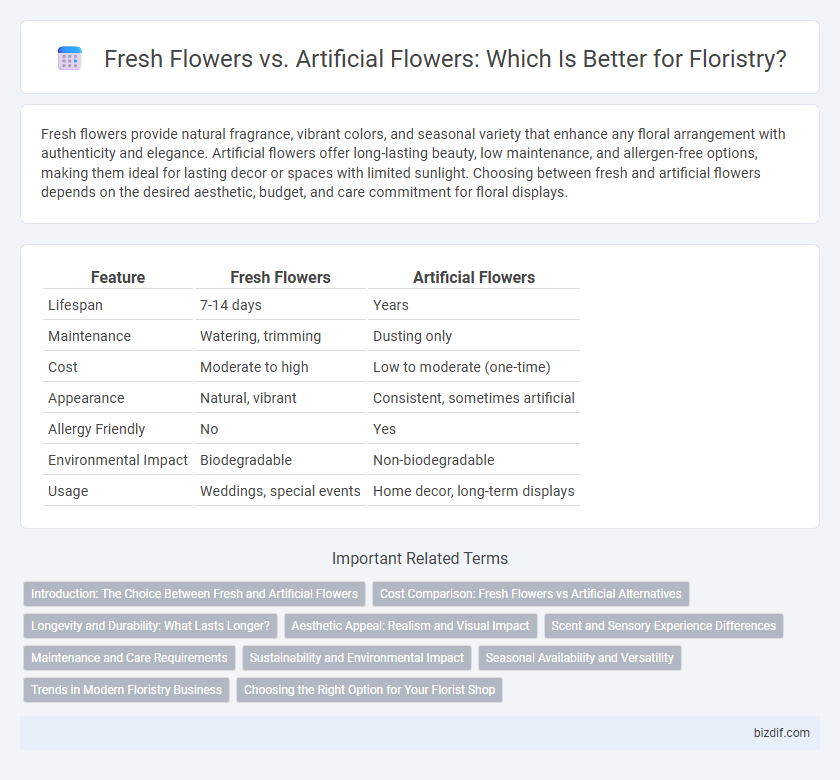Fresh flowers provide natural fragrance, vibrant colors, and seasonal variety that enhance any floral arrangement with authenticity and elegance. Artificial flowers offer long-lasting beauty, low maintenance, and allergen-free options, making them ideal for lasting decor or spaces with limited sunlight. Choosing between fresh and artificial flowers depends on the desired aesthetic, budget, and care commitment for floral displays.
Table of Comparison
| Feature | Fresh Flowers | Artificial Flowers |
|---|---|---|
| Lifespan | 7-14 days | Years |
| Maintenance | Watering, trimming | Dusting only |
| Cost | Moderate to high | Low to moderate (one-time) |
| Appearance | Natural, vibrant | Consistent, sometimes artificial |
| Allergy Friendly | No | Yes |
| Environmental Impact | Biodegradable | Non-biodegradable |
| Usage | Weddings, special events | Home decor, long-term displays |
Introduction: The Choice Between Fresh and Artificial Flowers
Fresh flowers offer unparalleled natural beauty, fragrance, and seasonal variety, making them a top choice for special occasions and home decor. Artificial flowers provide long-lasting durability, low maintenance, and allergen-free options, ideal for environments where upkeep is challenging. Choosing between fresh and artificial flowers depends on factors like budget, event duration, and personal preference for authenticity versus convenience.
Cost Comparison: Fresh Flowers vs Artificial Alternatives
Fresh flowers typically cost more due to the expenses of cultivation, harvesting, and rapid delivery, with prices fluctuating based on seasonality and flower variety. Artificial flowers, made from materials like silk or plastic, involve a higher initial investment but offer long-term savings by eliminating the need for replacement and maintenance. Choosing between fresh and artificial flowers depends on budget priorities, intended use, and desired longevity.
Longevity and Durability: What Lasts Longer?
Fresh flowers offer natural beauty and fragrance but typically last only a week or two before wilting, depending on the variety and care. Artificial flowers, crafted from materials like silk or plastic, can maintain their appearance indefinitely without wilting or fading. For long-term displays, artificial flowers provide superior longevity and durability compared to perishable fresh blooms.
Aesthetic Appeal: Realism and Visual Impact
Fresh flowers boast unparalleled realism with natural textures, vibrant colors, and authentic fragrance that enhance their visual impact in floral arrangements. Artificial flowers, often made from silk or high-quality plastic, provide consistent color and shape, maintaining aesthetic appeal over time without wilting or discoloration. Advances in manufacturing techniques have increased the realism of artificial flowers, but they typically lack the dynamic natural variations and subtle beauty found in fresh blooms.
Scent and Sensory Experience Differences
Fresh flowers emit natural fragrances that enhance ambiance and evoke emotions through their unique scents and textures, offering a rich sensory experience unmatched by artificial alternatives. Artificial flowers lack genuine scent profiles and tactile variations, resulting in a visually appealing but less immersive sensory encounter. The presence of natural essential oils in fresh blooms contributes significantly to their aromatic complexity and overall sensory impact.
Maintenance and Care Requirements
Fresh flowers demand consistent watering, temperature control, and regular trimming to prolong their lifespan, with daily attention essential to prevent wilting and decay. Artificial flowers require minimal maintenance, needing only occasional dusting or gentle cleaning to retain their appearance over time. Choosing between fresh and artificial depends heavily on the desired balance between natural beauty and low-maintenance durability.
Sustainability and Environmental Impact
Fresh flowers offer natural biodegradability and support pollinators, contributing positively to local ecosystems while requiring water and pesticides that can impact the environment. Artificial flowers, made from plastics and synthetic materials, often involve resource-intensive manufacturing and non-biodegradable waste, leading to long-term environmental harm. Choosing sustainably sourced fresh flowers or high-quality reusable artificial options reduces ecological footprints by minimizing chemical use and waste accumulation.
Seasonal Availability and Versatility
Fresh flowers offer unmatched vibrancy and fragrance but are limited by seasonal availability, which can restrict choices during off-peak times. Artificial flowers provide consistent beauty year-round without wilting, making them highly versatile for various decor and event needs regardless of season. Choosing between fresh and artificial flowers depends on the importance of natural aesthetics versus durability and flexibility in floral arrangements.
Trends in Modern Floristry Business
Modern floristry businesses increasingly favor fresh flowers for their natural fragrance, vibrant colors, and emotional appeal, which resonate strongly with eco-conscious consumers. Artificial flowers see rising demand in event decor and home settings due to their durability, cost-effectiveness, and minimal maintenance. Trends indicate a hybrid approach combining fresh blooms with high-quality silk arrangements to balance aesthetics and sustainability in contemporary floral design.
Choosing the Right Option for Your Florist Shop
Fresh flowers provide vibrant colors, natural fragrance, and seasonal variety that attract customers seeking authenticity and freshness. Artificial flowers offer durability, lower maintenance costs, and year-round availability, making them ideal for consistent displays and long-term use. Evaluating factors like customer preferences, budget constraints, and storage capabilities helps florists select the best option to enhance shop aesthetics and profitability.
Fresh Flowers vs Artificial Flowers Infographic

 bizdif.com
bizdif.com